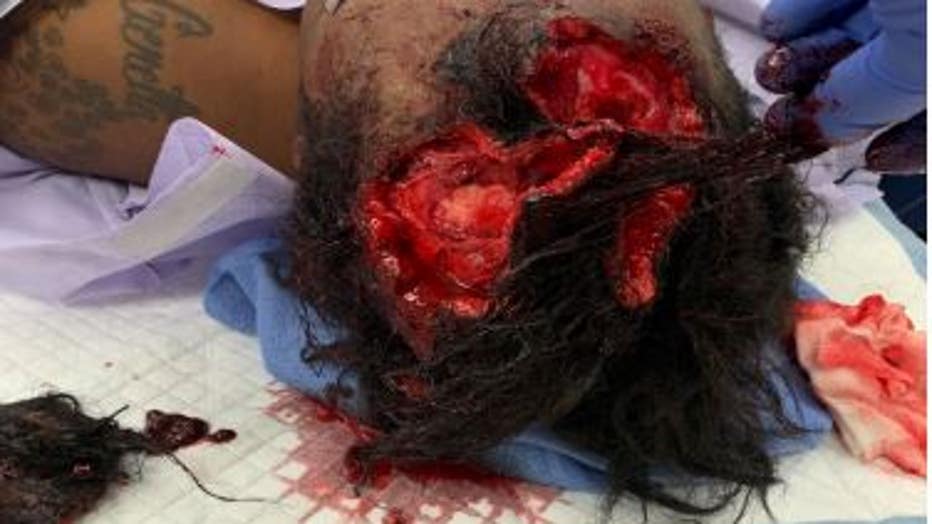Siccing K-9 for long duration constitutes excessive force, judge rules in Brentwood police bite case

Brentwood K-9 excessive force case can move forward
Ordering a police dog to bite a person doesn't necessarily constitute excessive force, but siccing a K-9 on a person for a long time does, a federal judge in San Francisco has ruled.
BRENTWOOD, Calif. - Ordering a police dog to bite a person doesn't necessarily constitute excessive force, but siccing a K-9 on a person for a long time does, a federal judge in San Francisco has ruled.
That was Monday's decision by U.S. District Court Judge Rita Lin in the case of Talmika Bates vs. Brentwood police officer Ryan Rezentes, whose dog Marco clamped down on the young woman's scalp for roughly a minute as she hid in the bushes after stealing thousands of dollars from a nearby Ulta store.
Lin said it was OK that Rezentes had his dog bite Bates in February 2020. But she ruled that the officer cannot claim qualified immunity in this case, specifically citing the duration and the location of the dog bite that left Bates with traumatic brain injury.
The head is a "uniquely vulnerable part of the body," the judge wrote.
The judge's order also noted that Rezentes did not give any warning that he had a K-9, allowing Bates to surrender, and he had not officially given Marco any command before the dog began biting Bates, who was hiding in the bushes.
GRAPHIC VIDEO: Body camera video shows rentwood police dog nearly ripping off woman's scalp
Ninth Circuit Court of Appeals precedent holds that excessive duration of a K-9 bite, or officers improperly encouraging a continued attack, could constitute excessive force and a constitutional violation, Lin wrote, "regardless of whether the initial dog bite was justified."
"Viewing the facts in Bates' favor, a reasonable jury could conclude that Rezentes violated the Fourth Amendment by allowing his dog to hold its bite on Bates' head for 40 seconds after she indicated her surrender," Line wrote. "A reasonable jury could conclude that the government's intrusion was severe."
Courthouse News Service first reported this legal development.
Qualified immunity is something that certain government officials, including police officers, can claim, and it essentially means: OK, I did it, but it was a reasonable mistake. It protects law enforcement from lawsuits that allege they violated someone's constitutional rights.
The judge's decision was a procedural hurdle that Bates and her legal team, Lawyers for the People, were thrilled to overcome, as now a jury can hear the story of what happened to her and decide on their own if the dog bite in February 2020 was warranted or not.
Adante Pointer, Bates' attorney, said the ruling is also significant as it puts K-9 use "under a microscope" as police dog bites are finally undergoing more scrutiny from the public and politicians.
"It's a big deal," Pointer said Wednesday.
WARNING: This picture is disturbing.

Talmika Bates Feb. 10, 2020 after a Brentwood police dog mauled her head.
The city of Brentwood did not immediately respond to the ruling, though Pointer said he expected them to appeal it.
The city also did not say whether Rezentes was still employed with the department, or if any police policies had changed since the brutal attack on Bates, that exposed her bloody scalp and caused her years of physical and emotional pain.
KTVU first reported about Bates' injuries in February 2022.
Meanwhile, Bates has since pleaded guilty to misdemeanor grand theft.
The judge's ruling also outlined a second-by-second play of what had occurred.
After 16 seconds, Bates shouts, "Oh my God, please get your dog. I'm coming out. I'm coming out, please get your dog," according to body camera from the scene.Rezentes tells her to crawl out to him.
"But your dog's biting me," Bates cries out.
Thirty seconds into the video, Rezentes crouches inside the bush, next to Bates, who is screaming, "My whole brain!"
Pictures from that day show her scalp has literally been ripped off her head.
For another 30 seconds, Bates calls out for her "mama."
Fifty-six seconds into the footage, Rezentes says, "Marco pust," which means release.
He repeats that command five seconds later.
Just after the one-minute mark, Rezentes removes Marco.
"Furthermore," Lin wrote, "a reasonable jury could conclude that Rezentes could see from his vantage point that the dog was biting Bates' head about 30 seconds after the bite, and thus that he needed to intervene as soon as reasonably possible, rather than waiting another 25-30 seconds to attempt a further release command."
Lisa Fernandez is a reporter for KTVU. Email Lisa at lisa.fernandez@fox.com or call her at 510-874-0139. Or follow her on Twitter @ljfernandez

